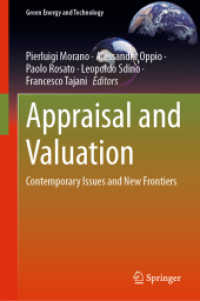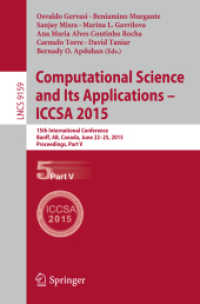- ホーム
- > 洋書
- > 英文書
- > Politics / International Relations
Full Description
This book critically engages with how formal and informal mechanisms of governance are used across the world. Specifically, it analyzes how the governance mechanisms of formal institutions are questioned, challenged and renegotiated through informal institutions. Whilst there is an emerging body of scholarship focusing on informal practices, this is scattered across a number of disciplines. This edited collection, by contrast, fosters a dialogue on these issues, moving away from monodisciplinary and normative methodologies that view informal institutions and practices simply as temporary economic phenomena. In doing so, the authors provide a wider understanding of how governance is composed of both the formal and the informal, which complement each other but are also constantly in competition. This novel approach will appeal to social scientists, economists, policy-makers, practitioners, and anyone else willing to widen their understanding of how governance works.
Contents
Introduction: Informal Economies as Varieties of Governance; Abel Polese, Colin C. Williams, Ioana A. Horodnic and Predrag Bejakovic.- Chapter 1. Why read informality in a substantive manner? On the embeddedness of the Soviet second economy; Lela Rekhviashvili.- Chapter 2. Informal Economy: the invisible hand of government; Abbas Khandan.- Chapter 3. Estimating the size of Croation shadow economy: a labour approach; Sabina Hodzic.- Chapter 4. Informal employment and earnings determination in Ukraine; Oksana Nezhyvenko and Philippe Adai.- Chapter 5. Approaching informality : rear-mirror methodology and ethnographic inquiry; Marius Wamsiedel.- Chapter 6. Explaining the informal economy in post-communities societies: a study of the asymmetry between formal and informal institutions in Romania; Colin C. Williams and Ioana A. Horodnic.- Chapter 7. Post-socialist informality rural style: impressions from Bulgaria; Diana Traikova.- Chapter 8. Exploring the practice of making informal paymentsin the health sector: some lessons from Greece; Adrian V. Horodnic, Colin C. Williams, Abel Polese, Adriana Zaiț and Liviu Oprea.- Chapter 9. Violent pressure on business and the size of the informal economy: evidence from Russian regions; Michael Rochlitz.- Chapter 10. Labor informality in Mexico: an indicator analysis; Rogelio Varela Llamas, Ramón A. Castillo Ponce and Juan Manuel Ocegueda Hernández.- Chapter 11. The interplay between formal and informal firms and its implications on jobs in francophone Africa: case studies of Senegal and Benin; Ahmadou Aly Mbaye, Nancy Claire Benjamin and Fatou Gueye.- Chapter 12. Governing informal payments by market in the Chinese healthcare system; Jingqing Yang.- Chapter 13. Social mechanisms of the counterpublic sphere: a case of a coffee farmers' cooperative in Lao PDR; Arihiro Minoo.- Chapter 14. Formalisation of entrepreneurship in the informal economy in Sub Saharan Africa (SSA) and the role of formal institutions: an analysis of Ghana's experience; Kwame Adom.- Chapter 15. Evidence on corruption in public procurements in health care and the implications for policy; Julia Schipperges, Milena Pavlova, Tetiana Stepurko, Paul Vincke and Wim Groot.








